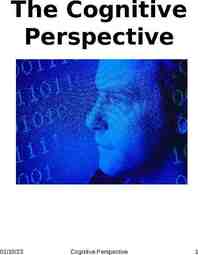PROPERTY D SLIDES 3-17-16 Saint Patrick’s Day National Corned Beef
84 Slides1.98 MB

PROPERTY D SLIDES 3-17-16 Saint Patrick’s Day National Corned Beef & Cabbage Day

Thursday March 17: Music to Accompany Shapira Barbra Streisand, The Way We Were (1974) On Course Page by 12:30 Today: On Course Page by 12:30 Tomorrow: Chapter 4 Tests from Fall 2010, Spring 2013, Spring 2014 Complete Answers & Explanations for Sample Question Bank and all Posted Tests Instructions Page for Your Test Chapter 4 Syllabus to be Attached to Your Test Chapter 5 Materials Updated Syllabus & Assignment Sheet Info Memos for Chapters 1 and 2 Rough Schedule for Feedback on Submitted Sample Exam Answers

OLYMPIC: Problem 4I Cont’d EEL GLACIER

Olympic: (4I): O conveys "to J and her heirs so long as the premises are not used for sale of beer, wine, or liquor, and if beer, wine, or liquor is sold on the premises, O retains a right to re-enter the premises." J opens a restaurant that serves several dishes cooked with wine or flamed with brandy and at Sunday brunch offers a free glass of champagne. The restaurant is successful, and 11 years after its opening D wants to buy it and add a bar. Advise D.

Olympic: (4I): O conveys "to J and her heirs so long as the premises are not used for sale of beer, wine, or liquor, and if beer, wine, or liquor is sold on the premises, O retains a right to re-enter the premises." MULTI-STEP ANALYSIS FSD or FSCS? (Last Time: Arguments Both Ways) CONDITION VIOLATED? (Last Time: Arguments Both Ways) EFFECT OF VIOLATION? If FSD & Poss. of Reverter? If FSCS & Rt. of Entry ADVICE RE PURCHASE

Olympic: (4I): O conveys "to J and her heirs so long as the premises are not used for sale of beer, wine, or liquor, and if beer, wine, or liquor is sold on the premises, O retains a right to re-enter the premises." Effect of Violation if J has FSD & O has Possibility of Reverter O gets legal title at moment of violation. If sufficient time has passed, J may have title through adverse possession. Effect of Violation if FSCS & Rt. of Entry?

Olympic: (4I): O conveys "to J and her heirs so long as the premises are not used for sale of beer, wine, or liquor, and if beer, wine, or liquor is sold on the premises, O retains a right to re-enter the premises." Effect of Violation if J has FSCS & O has Right of Entry Assuming O has not acted, O still has RE If O is aware of Julia’s use of alcohol, may be held to have waived the right to enforce regarding these kinds of uses of alcohol.

Olympic: (4I): O conveys "to J and her heirs so long as the premises are not used for sale of beer, wine, or liquor, and if beer, wine, or liquor is sold on the premises, O retains a right to re-enter the premises." MULTI-STEP ANALYSIS FSD or FSCS? CONDITION VIOLATED? EFFECT OF VIOLATION? (depends on FSD or FSCS) ADVICE RE PURCHASE?

Olympic: (4I): O conveys "to J and her heirs so long as the premises are not used for sale of beer, wine, or liquor, and if beer, wine, or liquor is sold on the premises, O retains a right to re-enter the premises." J opens a restaurant that serves several dishes cooked with wine or flamed with brandy and at Sunday brunch offers a free glass of champagne. The restaurant is successful, and 11 years after its opening D wants to buy it and add a bar. Possible Advice to D?

(4I) Plausible Advice to Donald Includes: Buy both present estate and future interest (or “all rights” of both J and O) to merge into fee simple absolute. Serve free liquor & raise prices (and argue waiver if O questions) Make purchase contingent on J insuring right to use alcohol (winning suit re adverse possession/ waiver/etc.; buying future interest/waiver from O) Find out if D is willing and able to sell beer/wine on nearby site for people to take into restaurant. QUESTIONS ON 4I?

(4I) Plausible Advice to Donald Test Note #5: Test Will Include At Least One Question Focused on Giving A Client This Type of Advice. E.g., Based on Facts of 4I, I might ask: Assume that J’s restaurant is successful. 11 years after its opening, your client D wants to buy it and add a bar. Which of the following suggestions would it be helpful for you to make to D?:

EXAM TIP: “Which of the Following Arguments Does [Not] Support ?” Can Arise in Context of: Fee Simple v. Life Estate (White, Prob. 4O) FSD v. FSCS (Mahrenholz, Prob. 4I) Whether a Condition is Valid (Prob. 4O, Shapira) Advice Question (just described) Timing Ambiguities (after Shapira)

EXAM TIP: “Which of the Following Arguments Does [Not] Support ?” For an Argument to “Support” a Particular Legal Result (or for Advice to be “Helpful”): 1. It Must Be Legally and Factually Correct and 2. It Must Logically Suggest that the Result is More Likely or More Desirable Than the Alternative

In 2006, Brian grants Mason-acre “to Dolly for life, then to Jessica so long as she never tries to sell Mason-acre, otherwise to Mike and Mili.” At the time of the grant, Jessica has a (a) Vested remainder in fee simple determinable. (b) Vested remainder in fee simple absolute. (c) Vested remainder in fee simple on executory limitation. (d) Vested remainder subject to divestment. Take a moment and try this.

In 2006, Brian grants Mason-acre “to Dolly for life, then to Jessica so long as she never tries to sell Mason-acre, otherwise to Mike and Mili.” At the time of the grant, Jessica has a (a) Vested remainder in fee simple determinable. (b) Vested remainder in fee simple absolute. (c) Vested remainder in fee simple on executory limitation. (d) Vested remainder subject to divestment. Why is (b) the correct answer?

Conditions: Additional Information Unacceptable Conditions Problem 4O Shapira Timing Issues

Unacceptable Conditions Conditions So Abhorrent

Unacceptable Conditions Conditions So Abhorrent You Can’t Even Impose Them

Unacceptable Conditions Total Restraint on Alienation

Unacceptable Conditions In 2006, Brian grants Mason-acre “to Dolly for life, then to Jessica so long as she never tries to sell Mason-acre, otherwise to Mike and Mili.” Total Restraint on Alienation is Invalid

Unacceptable Conditions In 2006, Brian grants Mason-acre “to Dolly for life, then to Jessica so long as she never tries to sell Mason-acre, otherwise to Mike and Mili.” Total Restraint on Alienation is Invalid Pencil Out Unlawful Condition (and executory interest that turns on it)

Unacceptable Conditions In 2006, Brian grants Mason-acre “to Dolly for life, then to Jessica so long as she never tries to sell Mason-acre, otherwise to Mike and Mili.” Total Restraint on Alienation is Invalid Pencil Out Unlawful Condition (and executory interest that turns on it) Result is Vested Remainder in Fee Simple Absolute (2006 “Today”)

Unacceptable Conditions In 2006, Brian grants Mason-acre “to Dolly for life, then to Jessica so long as she never tries to sell Mason-acre, otherwise to Mike and Mili.” Exam Question Fall 2007 & Spring 2010 1st Time Nasty b/c New & at End of Test: (1/63 students got it) 2d Time (with warning) about 45% got it. READ CAREFULLY!!

Unacceptable Conditions Total Restraint on Alienation Partial Restraint OK if Reasonable

Unacceptable Conditions Total Restraint on Alienation Partial Restraint OK if Reasonable Most Restrictions Restrain Alienation to Some Extent If too burdensome/weird could treat as too much restraint (b/c nobody will purchase) See Casebook at P565-66 Maybe: “so long as the owner stays on the parcel every night.”

Unacceptable Conditions Total Restraint on Alienation Partial Restraint OK if Reasonable Most Restrictions Restrain Alienation to Some Extent Use Restrictions (Use Only by X?) OK if Charitable Some jurisd: Non-Charitable Unreas. Restraint on Alienation

Unacceptable Conditions Total Restraint on Alienation Doing Criminal Acts “To Suki if she murders Ricky”
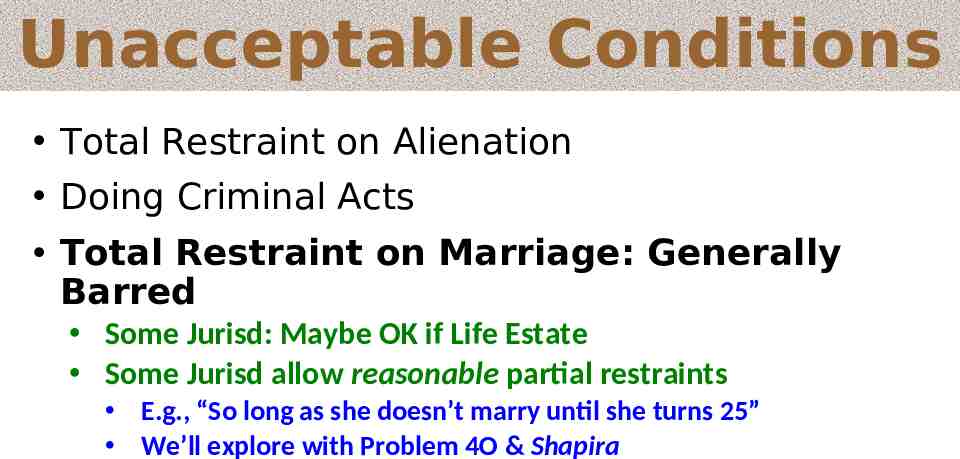
Unacceptable Conditions Total Restraint on Alienation Doing Criminal Acts Total Restraint on Marriage: Generally Barred Some Jurisd: Maybe OK if Life Estate Some Jurisd allow reasonable partial restraints E.g., “So long as she doesn’t marry until she turns 25” We’ll explore with Problem 4O & Shapira

Unacceptable Conditions Total Restraint on Alienation Doing Criminal Acts Total Restraint on Marriage: Generally Barred Encouraging Divorce (Evil In-Laws Grant): “To Sansa so long as she divorces Tyrion”

Unacceptable Conditions Total Restraint on Alienation Doing Criminal Acts Total Restraint on Marriage: Generally Barred Encouraging Divorce (Evil In-Laws Grant): Grant Penalizing Divorce Seems to be OK “To Sansa for Life, but if she divorces Tyrion, to Jon”
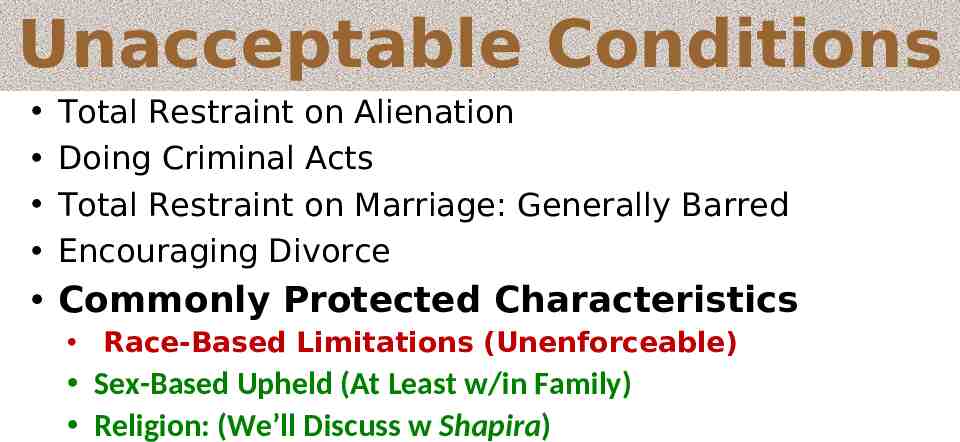
Unacceptable Conditions Total Restraint on Alienation Doing Criminal Acts Total Restraint on Marriage: Generally Barred Encouraging Divorce Commonly Protected Characteristics Race-Based Limitations (Unenforceable) Sex-Based Upheld (At Least w/in Family) Religion: (We’ll Discuss w Shapira)
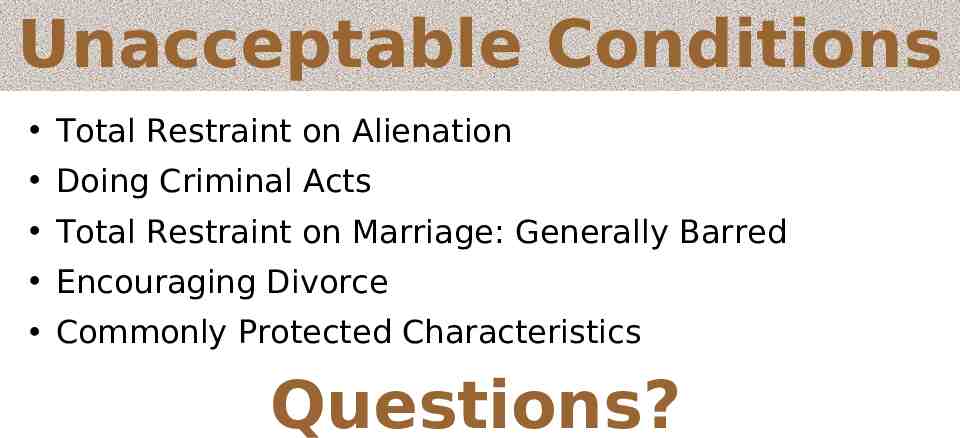
Unacceptable Conditions Total Restraint on Alienation Doing Criminal Acts Total Restraint on Marriage: Generally Barred Encouraging Divorce Commonly Protected Characteristics Questions?

Conditions: Additional Information Unacceptable Conditions Problem 4O Shapira Timing Issues

ACADIA: Problem 4O Sunrise
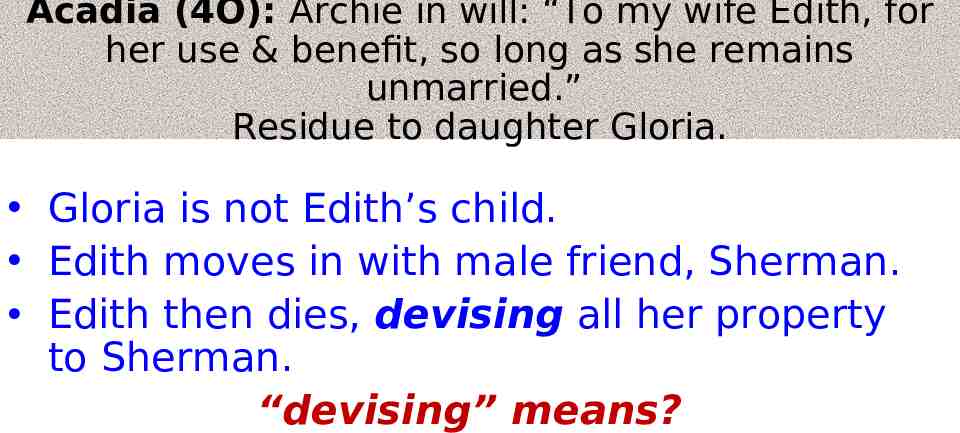
Acadia (4O): Archie in will: “To my wife Edith, for her use & benefit, so long as she remains unmarried.” Residue to daughter Gloria. Gloria is not Edith’s child. Edith moves in with male friend, Sherman. Edith then dies, devising all her property to Sherman. “devising” means?
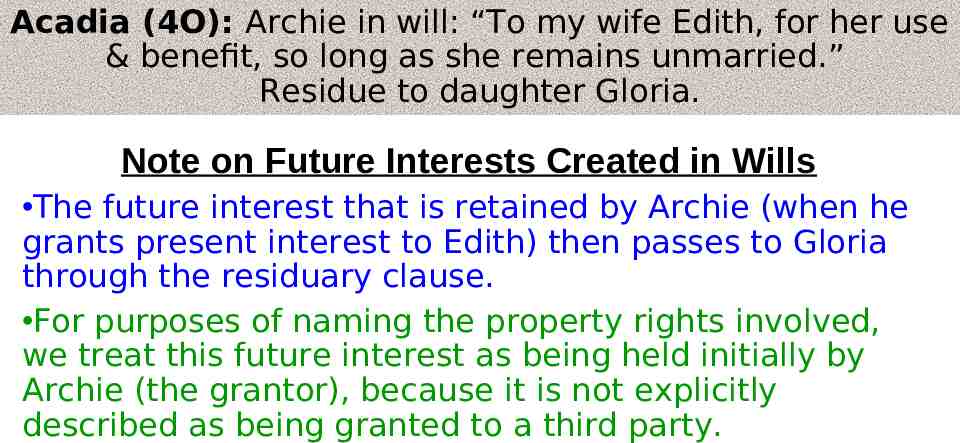
Acadia (4O): Archie in will: “To my wife Edith, for her use & benefit, so long as she remains unmarried.” Residue to daughter Gloria. Note on Future Interests Created in Wills The future interest that is retained by Archie (when he grants present interest to Edith) then passes to Gloria through the residuary clause. For purposes of naming the property rights involved, we treat this future interest as being held initially by Archie (the grantor), because it is not explicitly described as being granted to a third party.
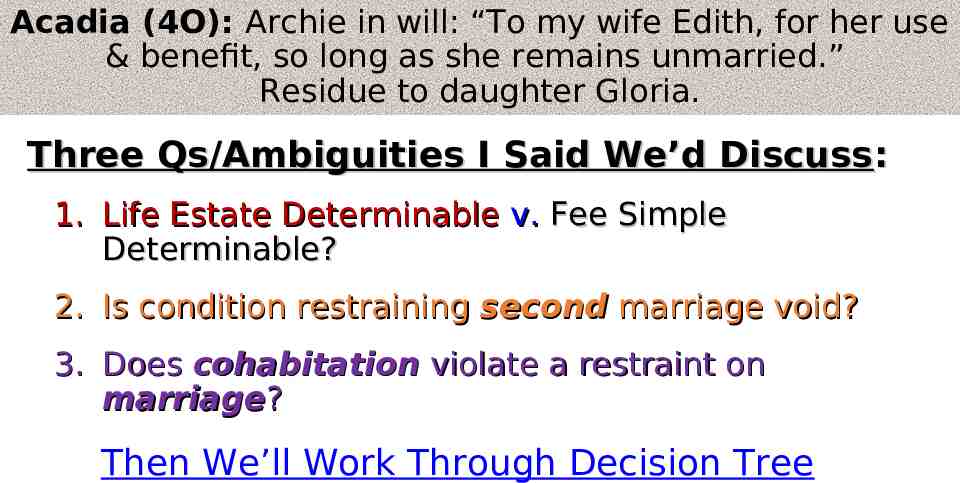
Acadia (4O): Archie in will: “To my wife Edith, for her use & benefit, so long as she remains unmarried.” Residue to daughter Gloria. Three Qs/Ambiguities I Said We’d Discuss: 1. Life Estate Determinable v. Fee Simple Determinable? 2. Is condition restraining second marriage void? 3. Does cohabitation violate a restraint on marriage? Then We’ll Work Through Decision Tree
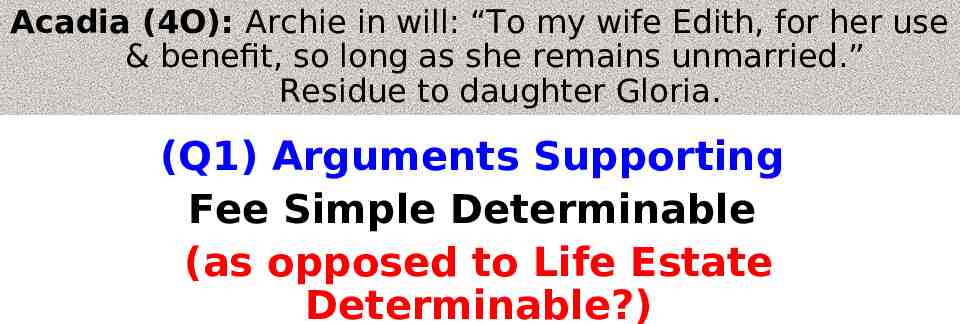
Acadia (4O): Archie in will: “To my wife Edith, for her use & benefit, so long as she remains unmarried.” Residue to daughter Gloria. (Q1) Arguments Supporting Fee Simple Determinable (as opposed to Life Estate Determinable?)
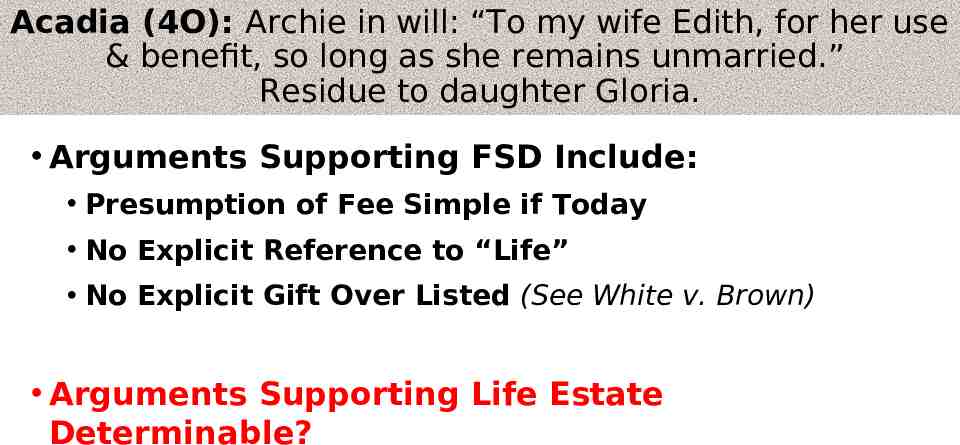
Acadia (4O): Archie in will: “To my wife Edith, for her use & benefit, so long as she remains unmarried.” Residue to daughter Gloria. Arguments Supporting FSD Include: Presumption of Fee Simple if Today No Explicit Reference to “Life” No Explicit Gift Over Listed (See White v. Brown) Arguments Supporting Life Estate Determinable?
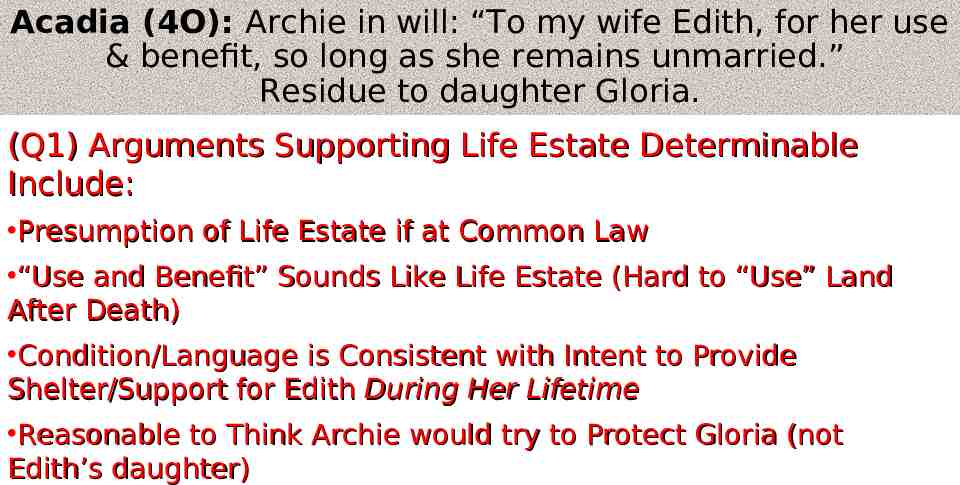
Acadia (4O): Archie in will: “To my wife Edith, for her use & benefit, so long as she remains unmarried.” Residue to daughter Gloria. (Q1) Arguments Supporting Life Estate Determinable Include: Presumption of Life Estate if at Common Law “Use and Benefit” Sounds Like Life Estate (Hard to “Use” Land After Death) Condition/Language is Consistent with Intent to Provide Shelter/Support for Edith During Her Lifetime Reasonable to Think Archie would try to Protect Gloria (not Edith’s daughter)
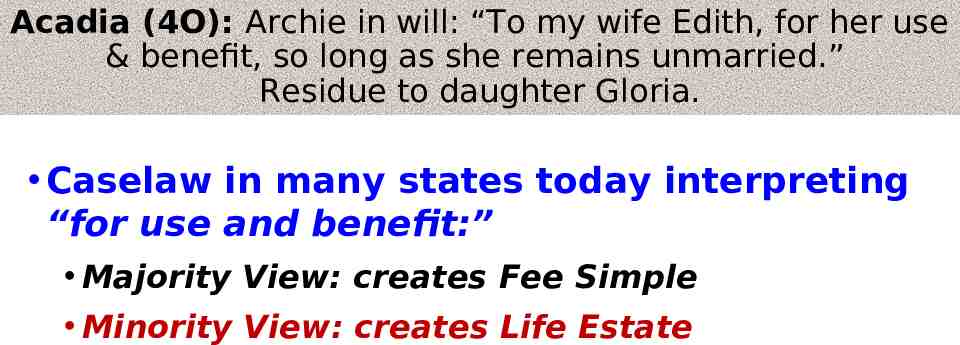
Acadia (4O): Archie in will: “To my wife Edith, for her use & benefit, so long as she remains unmarried.” Residue to daughter Gloria. Caselaw in many states today interpreting “for use and benefit:” Majority View: creates Fee Simple Minority View: creates Life Estate
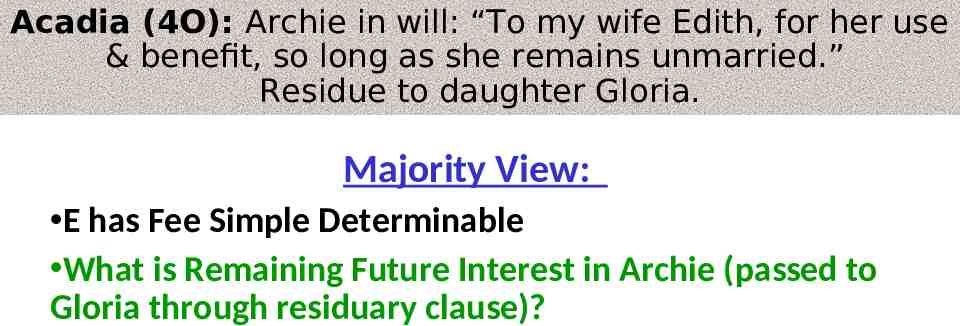
Acadia (4O): Archie in will: “To my wife Edith, for her use & benefit, so long as she remains unmarried.” Residue to daughter Gloria. Majority View: E has Fee Simple Determinable What is Remaining Future Interest in Archie (passed to Gloria through residuary clause)?

Acadia (4O): Archie in will: “To my wife Edith, for her use & benefit, so long as she remains unmarried.” Residue to daughter Gloria. Majority View: E has Fee Simple Determinable A G: Possibility of Reverter
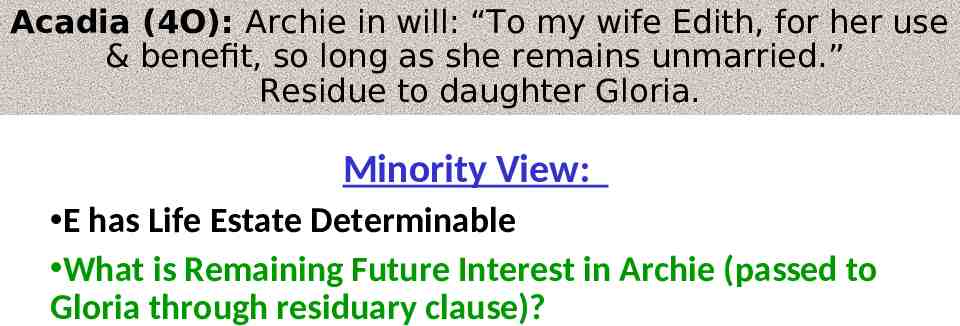
Acadia (4O): Archie in will: “To my wife Edith, for her use & benefit, so long as she remains unmarried.” Residue to daughter Gloria. Minority View: E has Life Estate Determinable What is Remaining Future Interest in Archie (passed to Gloria through residuary clause)?
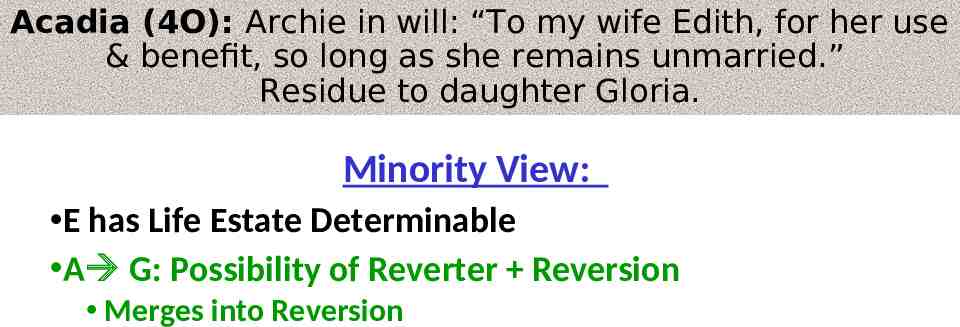
Acadia (4O): Archie in will: “To my wife Edith, for her use & benefit, so long as she remains unmarried.” Residue to daughter Gloria. Minority View: E has Life Estate Determinable A G: Possibility of Reverter Reversion Merges into Reversion
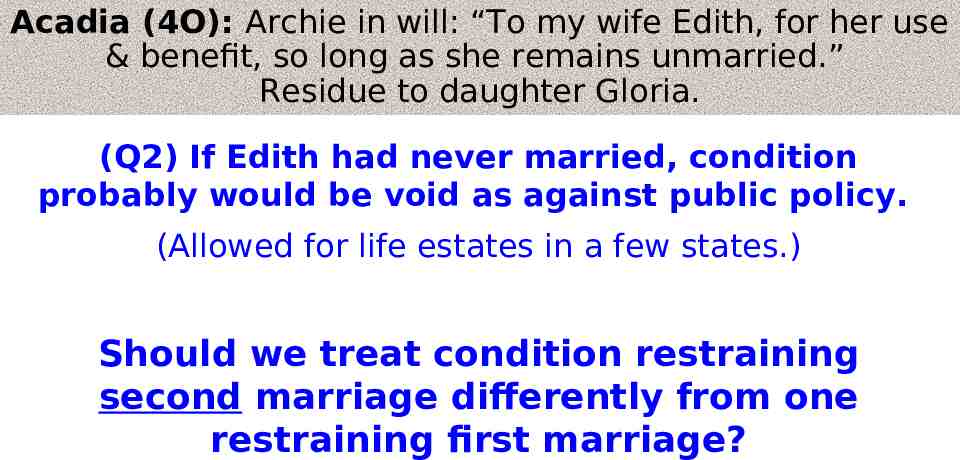
Acadia (4O): Archie in will: “To my wife Edith, for her use & benefit, so long as she remains unmarried.” Residue to daughter Gloria. (Q2) If Edith had never married, condition probably would be void as against public policy. (Allowed for life estates in a few states.) Should we treat condition restraining second marriage differently from one restraining first marriage?
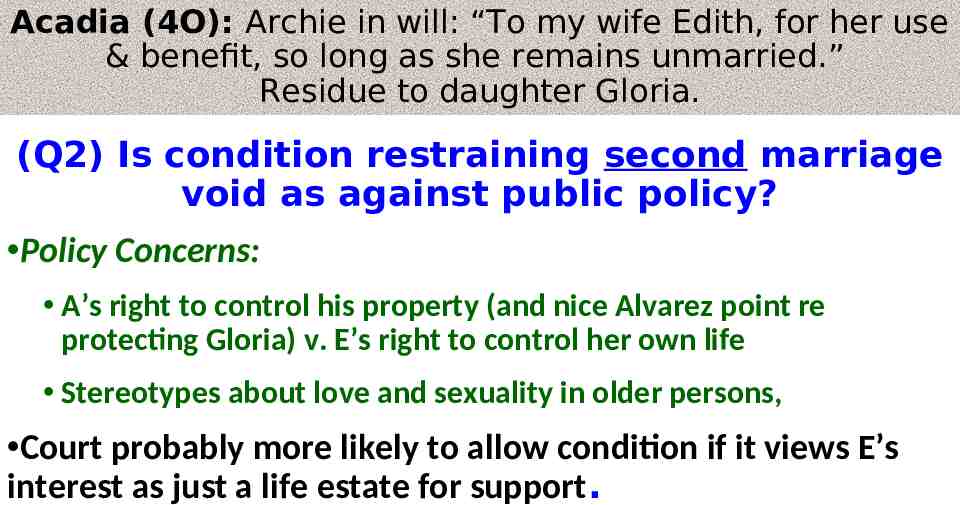
Acadia (4O): Archie in will: “To my wife Edith, for her use & benefit, so long as she remains unmarried.” Residue to daughter Gloria. (Q2) Is condition restraining second marriage void as against public policy? Policy Concerns: A’s right to control his property (and nice Alvarez point re protecting Gloria) v. E’s right to control her own life Stereotypes about love and sexuality in older persons, Court probably more likely to allow condition if it views E’s interest as just a life estate for support.
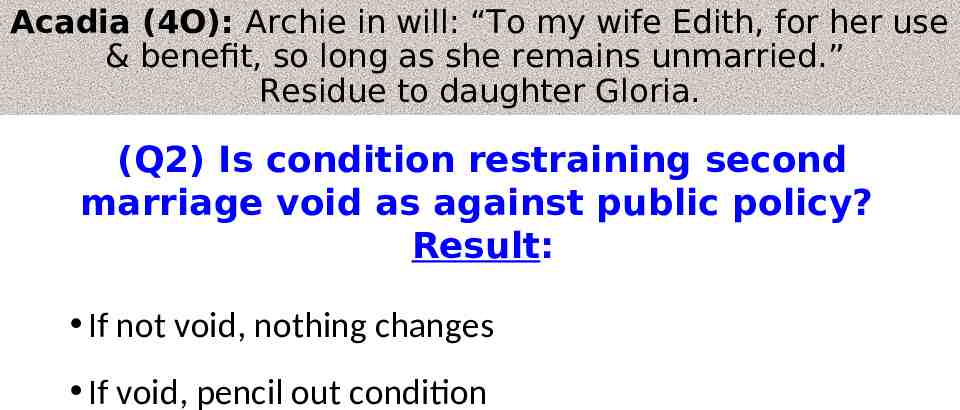
Acadia (4O): Archie in will: “To my wife Edith, for her use & benefit, so long as she remains unmarried.” Residue to daughter Gloria. (Q2) Is condition restraining second marriage void as against public policy? Result: If not void, nothing changes If void, pencil out condition

Acadia (4O): Archie in will: “To my wife Edith, for her use & benefit, so long as she remains unmarried.” Residue to daughter Gloria. If condition void, pencil out condition: “To my wife Edith, for her use & benefit, so long as she remains unmarried.”
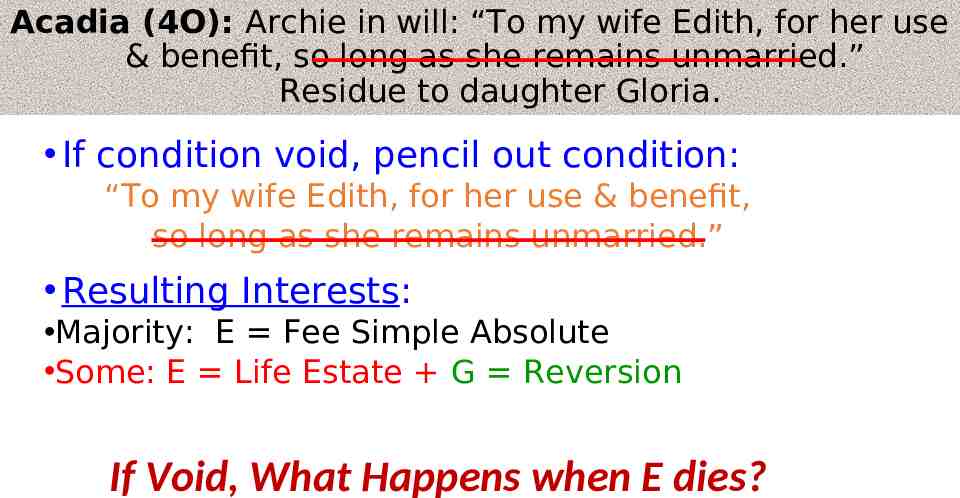
Acadia (4O): Archie in will: “To my wife Edith, for her use & benefit, so long as she remains unmarried.” Residue to daughter Gloria. If condition void, pencil out condition: “To my wife Edith, for her use & benefit, so long as she remains unmarried.” Resulting Interests: Majority: E Fee Simple Absolute Some: E Life Estate G Reversion If Void, What Happens when E dies?
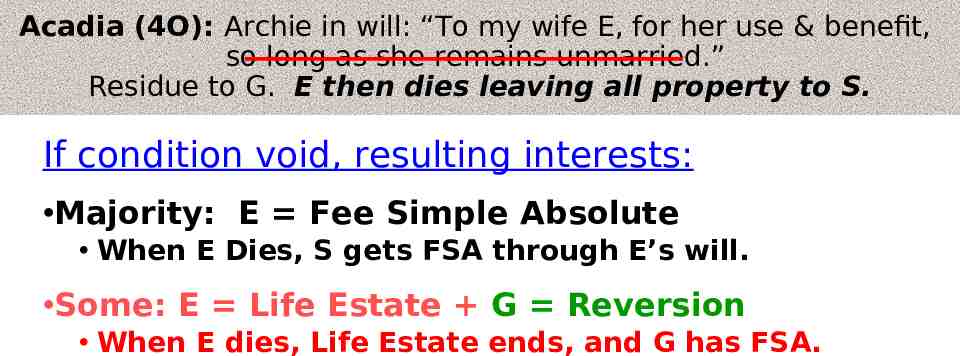
Acadia (4O): Archie in will: “To my wife E, for her use & benefit, so long as she remains unmarried.” Residue to G. E then dies leaving all property to S. If condition void, resulting interests: Majority: E Fee Simple Absolute When E Dies, S gets FSA through E’s will. Some: E Life Estate G Reversion When E dies, Life Estate ends, and G has FSA.
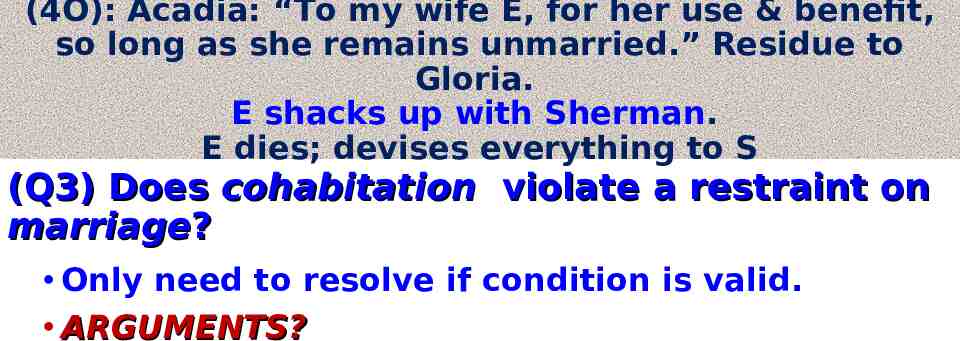
(4O): Acadia: “To my wife E, for her use & benefit, so long as she remains unmarried.” Residue to Gloria. E shacks up with Sherman. E dies; devises everything to S (Q3) Does cohabitation violate a restraint on marriage? Only need to resolve if condition is valid. ARGUMENTS?
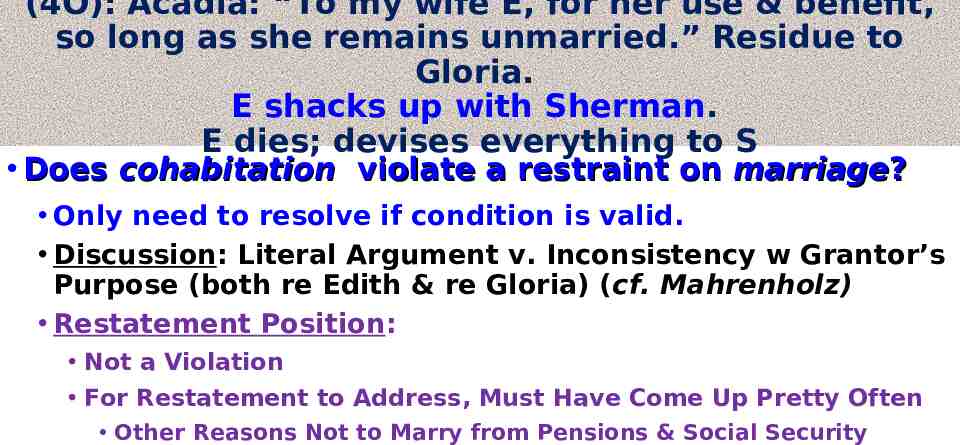
(4O): Acadia: “To my wife E, for her use & benefit, so long as she remains unmarried.” Residue to Gloria. E shacks up with Sherman. E dies; devises everything to S Does cohabitation violate a restraint on marriage? Only need to resolve if condition is valid. Discussion: Literal Argument v. Inconsistency w Grantor’s Purpose (both re Edith & re Gloria) (cf. Mahrenholz) Restatement Position: Not a Violation For Restatement to Address, Must Have Come Up Pretty Often Other Reasons Not to Marry from Pensions & Social Security
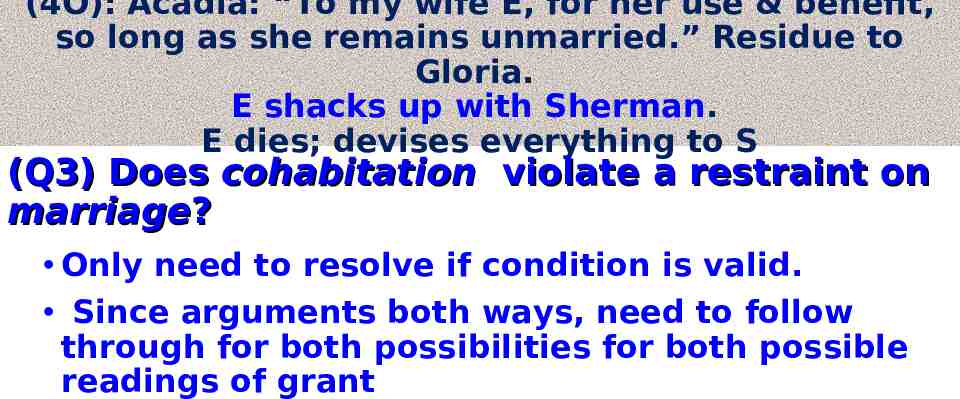
(4O): Acadia: “To my wife E, for her use & benefit, so long as she remains unmarried.” Residue to Gloria. E shacks up with Sherman. E dies; devises everything to S (Q3) Does cohabitation violate a restraint on marriage? Only need to resolve if condition is valid. Since arguments both ways, need to follow through for both possibilities for both possible readings of grant

(4O): Acadia: A in Will: “To my wife E, for her use & benefit, so long as she remains unmarried.” Residue to G. E shacks up with Sherman. E dies; devises everything to S Minority: E LED G Reversion (incl. Poss. of Reverter). If Condition is Violated? If Condition is Not Violated?
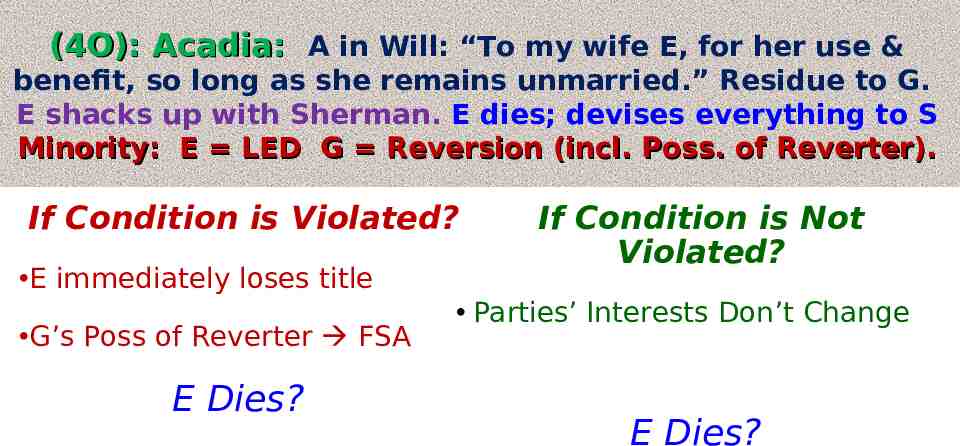
(4O): Acadia: A in Will: “To my wife E, for her use & benefit, so long as she remains unmarried.” Residue to G. E shacks up with Sherman. E dies; devises everything to S Minority: E LED G Reversion (incl. Poss. of Reverter). If Condition is Violated? E immediately loses title G’s Poss of Reverter FSA E Dies? If Condition is Not Violated? Parties’ Interests Don’t Change E Dies?
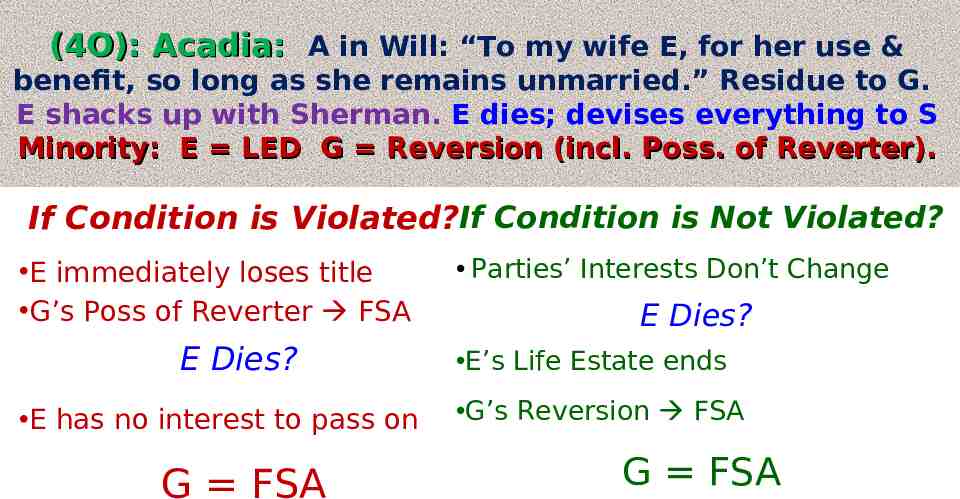
(4O): Acadia: A in Will: “To my wife E, for her use & benefit, so long as she remains unmarried.” Residue to G. E shacks up with Sherman. E dies; devises everything to S Minority: E LED G Reversion (incl. Poss. of Reverter). If Condition is Violated?If Condition is Not Violated? E immediately loses title G’s Poss of Reverter FSA E Dies? E has no interest to pass on G FSA Parties’ Interests Don’t Change E Dies? E’s Life Estate ends G’s Reversion FSA G FSA
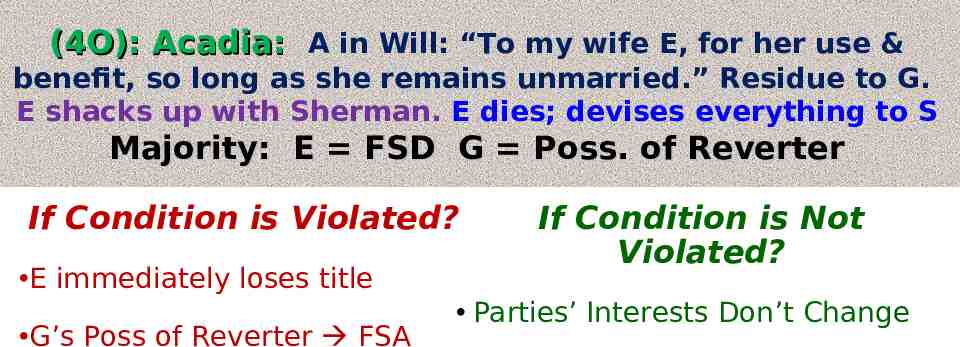
(4O): Acadia: A in Will: “To my wife E, for her use & benefit, so long as she remains unmarried.” Residue to G. E shacks up with Sherman. E dies; devises everything to S Majority: E FSD G Poss. of Reverter If Condition is Violated? E immediately loses title G’s Poss of Reverter FSA If Condition is Not Violated? Parties’ Interests Don’t Change
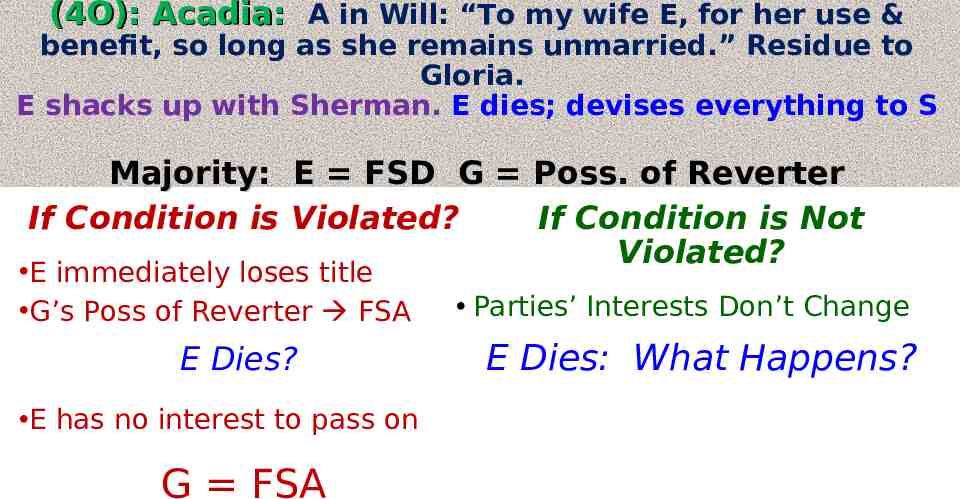
(4O): Acadia: A in Will: “To my wife E, for her use & benefit, so long as she remains unmarried.” Residue to Gloria. E shacks up with Sherman. E dies; devises everything to S Majority: E FSD G Poss. of Reverter If Condition is Violated? If Condition is Not Violated? E immediately loses title G’s Poss of Reverter FSA E Dies? E has no interest to pass on G FSA Parties’ Interests Don’t Change E Dies: What Happens?
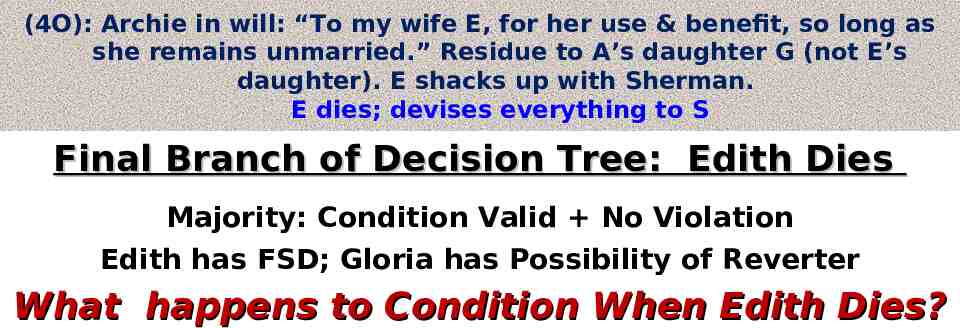
(4O): Archie in will: “To my wife E, for her use & benefit, so long as she remains unmarried.” Residue to A’s daughter G (not E’s daughter). E shacks up with Sherman. E dies; devises everything to S Final Branch of Decision Tree: Edith Dies Majority: Condition Valid No Violation Edith has FSD; Gloria has Possibility of Reverter What happens to Condition When Edith Dies?
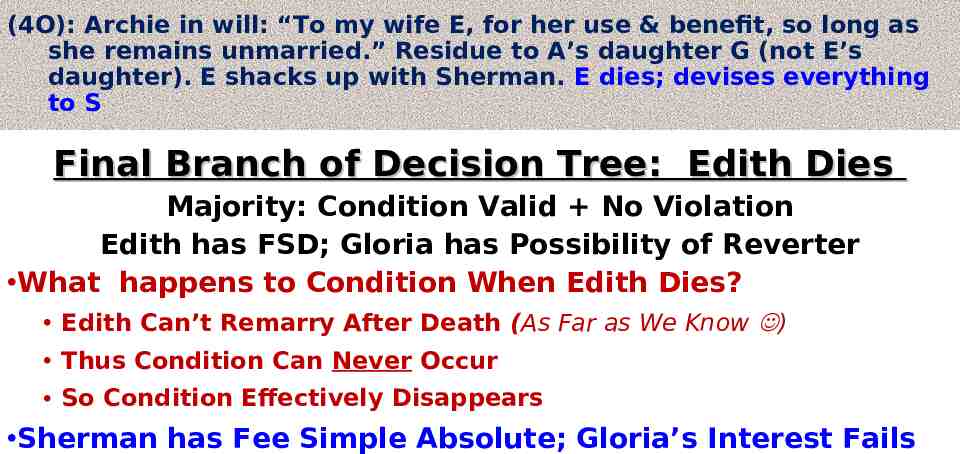
(4O): Archie in will: “To my wife E, for her use & benefit, so long as she remains unmarried.” Residue to A’s daughter G (not E’s daughter). E shacks up with Sherman. E dies; devises everything to S Final Branch of Decision Tree: Edith Dies Majority: Condition Valid No Violation Edith has FSD; Gloria has Possibility of Reverter What happens to Condition When Edith Dies? Edith Can’t Remarry After Death (As Far as We Know ) Thus Condition Can Never Occur So Condition Effectively Disappears Sherman has Fee Simple Absolute; Gloria’s Interest Fails
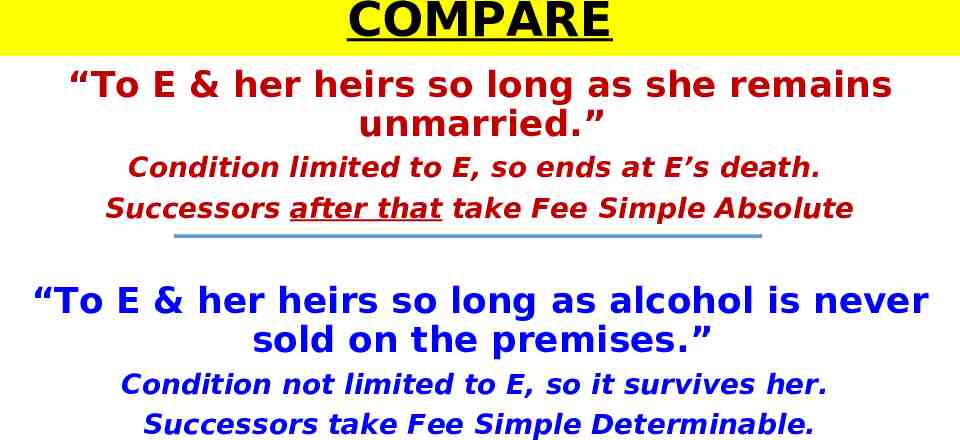
COMPARE “To E & her heirs so long as she remains unmarried.” Condition limited to E, so ends at E’s death. Successors after that take Fee Simple Absolute “To E & her heirs so long as alcohol is never sold on the premises.” Condition not limited to E, so it survives her. Successors take Fee Simple Determinable.

Qs on Problem 4O?

Tomorrow 1. We’ll Complete Shapira & Timing Issues 2. Materials on Rule against Perpetuities Rule itself “Not on Test; Information Only” (NOTIO) Grants addressed fair game for identification, vesting & failing 3. Review Problems: Everglades (4P/4S) & Sequoia (4Q/4R) Be Prepared to: Identify List of Contestable Issues (as I did for you on 4I & 4O) Work Through Flow Chart of Possible Iterations (as we did for Mahrenholz & 4O) I’ll Post Slides/Write-Ups for All

Conditions: Additional Information Unacceptable Conditions Problem 4O Shapira Timing Issues

BADLANDS: DQ4.13-4.15 NORBECK PASS
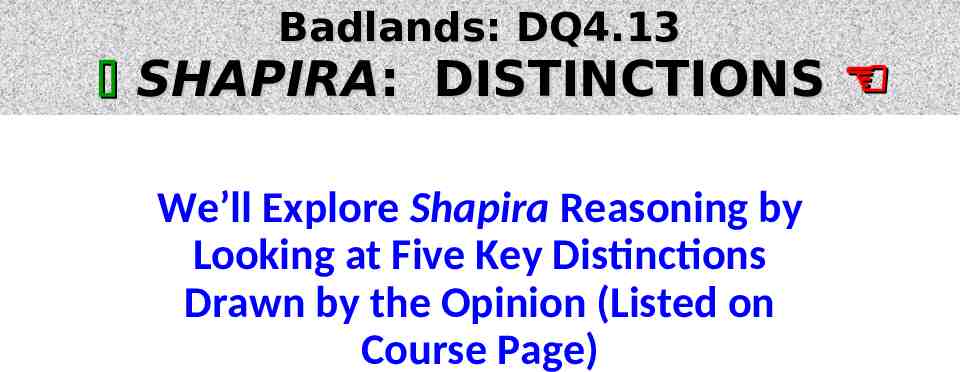
Badlands: DQ4.13 SHAPIRA: DISTINCTIONS We’ll Explore Shapira Reasoning by Looking at Five Key Distinctions Drawn by the Opinion (Listed on Course Page)
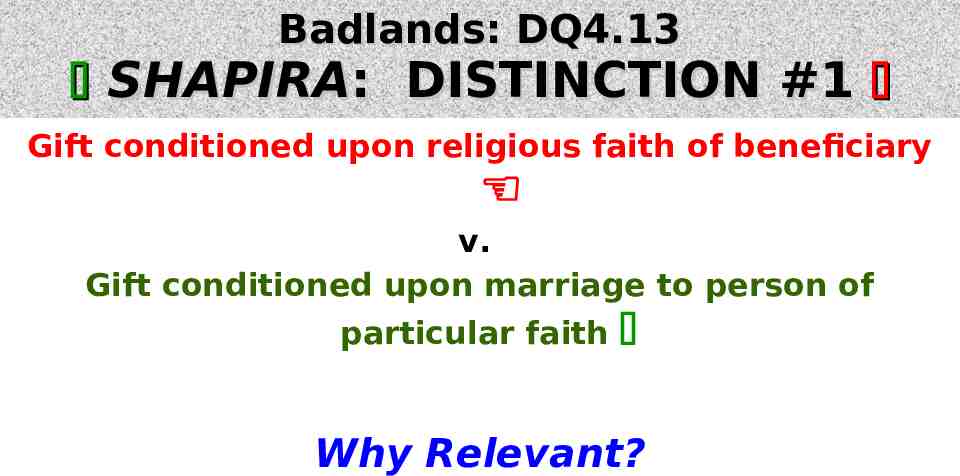
Badlands: DQ4.13 SHAPIRA: DISTINCTION #1 Gift conditioned upon religious faith of beneficiary v. Gift conditioned upon marriage to person of particular faith Why Relevant?
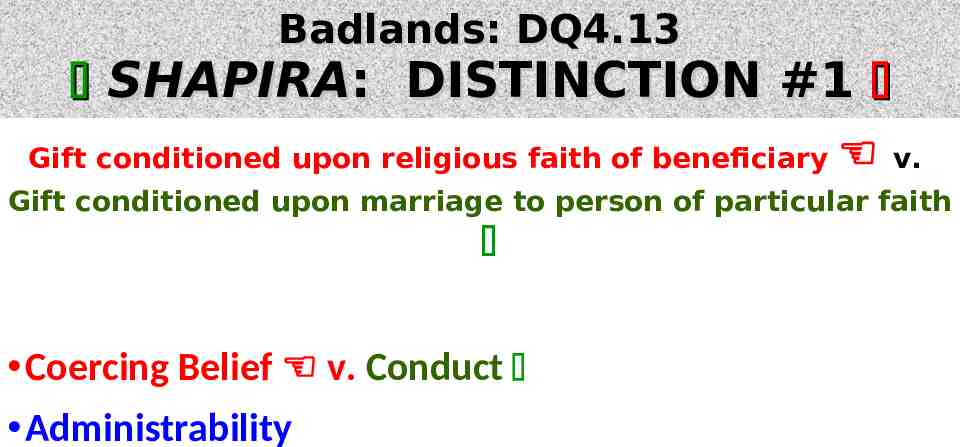
Badlands: DQ4.13 SHAPIRA: DISTINCTION #1 Gift conditioned upon religious faith of beneficiary v. Gift conditioned upon marriage to person of particular faith Coercing Belief v. Conduct Administrability
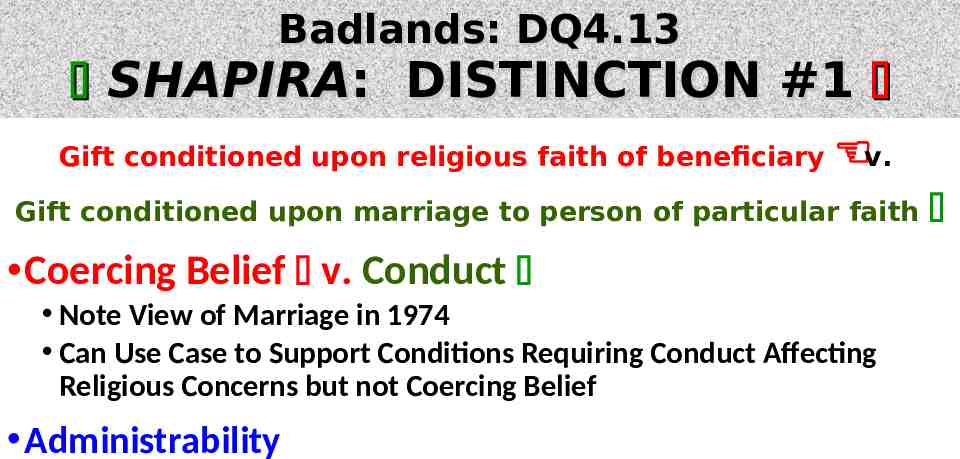
Badlands: DQ4.13 SHAPIRA: DISTINCTION #1 Gift conditioned upon religious faith of beneficiary v. Gift conditioned upon marriage to person of particular faith Coercing Belief v. Conduct Note View of Marriage in 1974 Can Use Case to Support Conditions Requiring Conduct Affecting Religious Concerns but not Coercing Belief Administrability
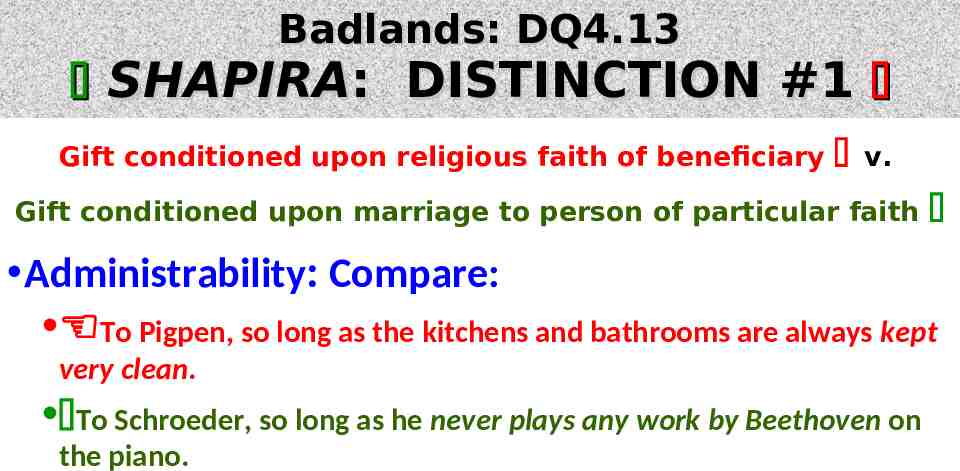
Badlands: DQ4.13 SHAPIRA: DISTINCTION #1 Gift conditioned upon religious faith of beneficiary v. Gift conditioned upon marriage to person of particular faith Administrability: Compare: To Pigpen, so long as the kitchens and bathrooms are always kept very clean. To Schroeder, so long as he never plays any work by Beethoven on the piano.
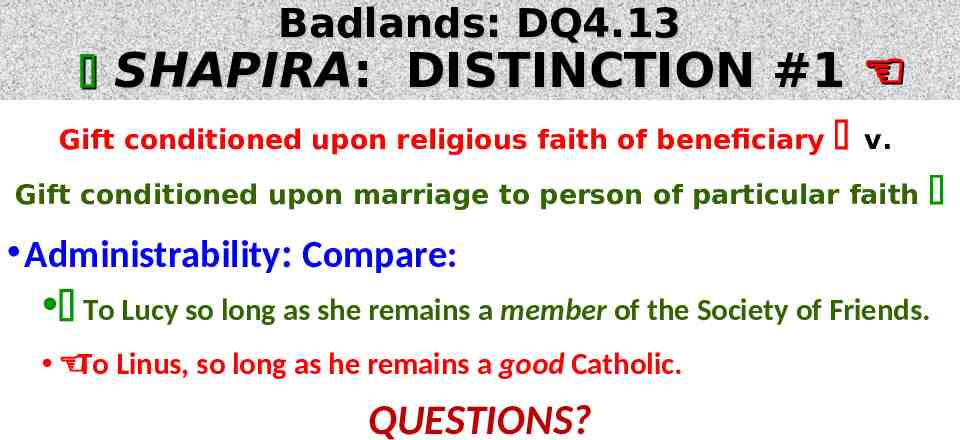
Badlands: DQ4.13 SHAPIRA: DISTINCTION #1 Gift conditioned upon religious faith of beneficiary v. Gift conditioned upon marriage to person of particular faith Administrability: Compare: To Lucy so long as she remains a member of the Society of Friends. To Linus, so long as he remains a good Catholic. QUESTIONS?
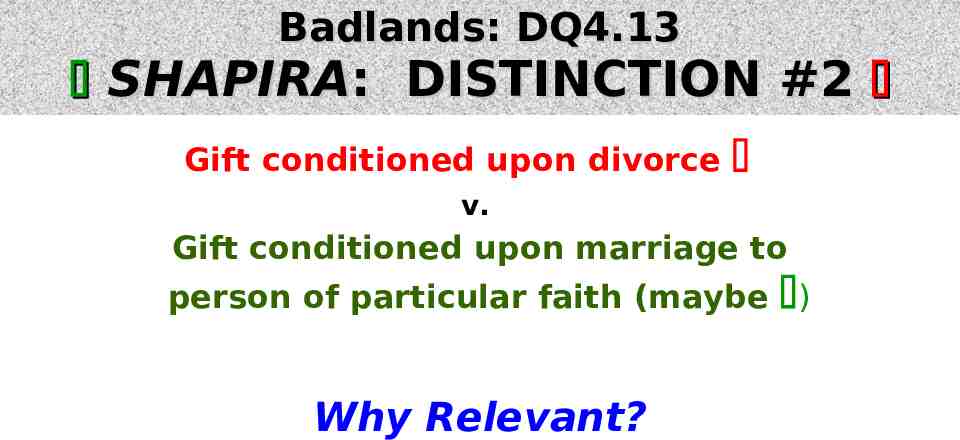
Badlands: DQ4.13 SHAPIRA: DISTINCTION #2 Gift conditioned upon divorce v. Gift conditioned upon marriage to person of particular faith (maybe ) Why Relevant?
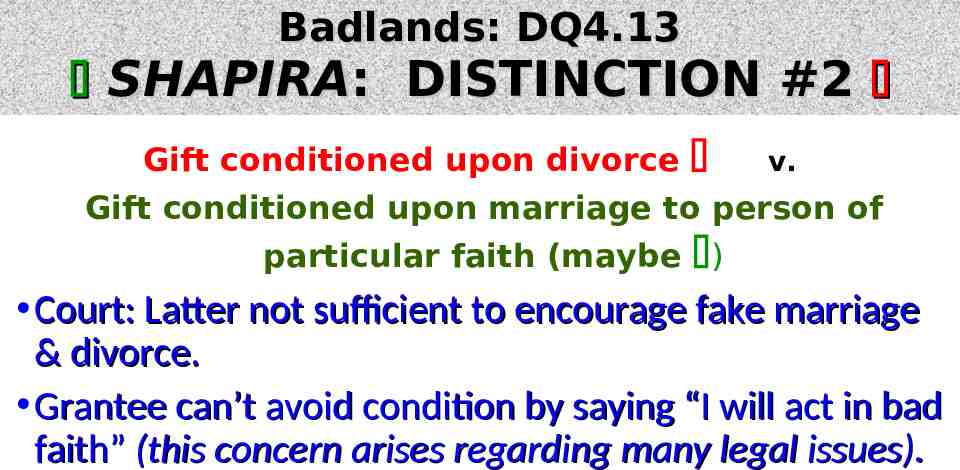
Badlands: DQ4.13 SHAPIRA: DISTINCTION #2 Gift conditioned upon divorce v. Gift conditioned upon marriage to person of particular faith (maybe ) Court: Latter not sufficient to encourage fake marriage & divorce. Grantee can’t avoid condition by saying “I will act in bad faith” (this concern arises regarding many legal issues).
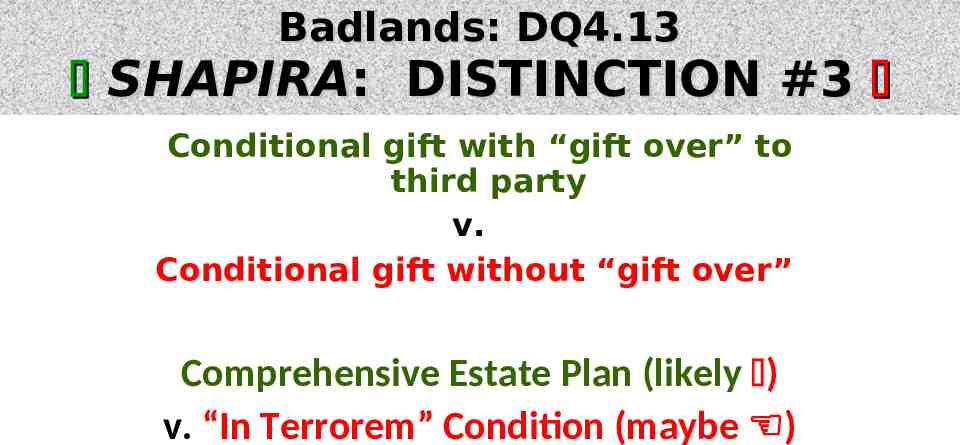
Badlands: DQ4.13 SHAPIRA: DISTINCTION #3 Conditional gift with “gift over” to third party v. Conditional gift without “gift over” Comprehensive Estate Plan (likely ) v. “In Terrorem” Condition (maybe )
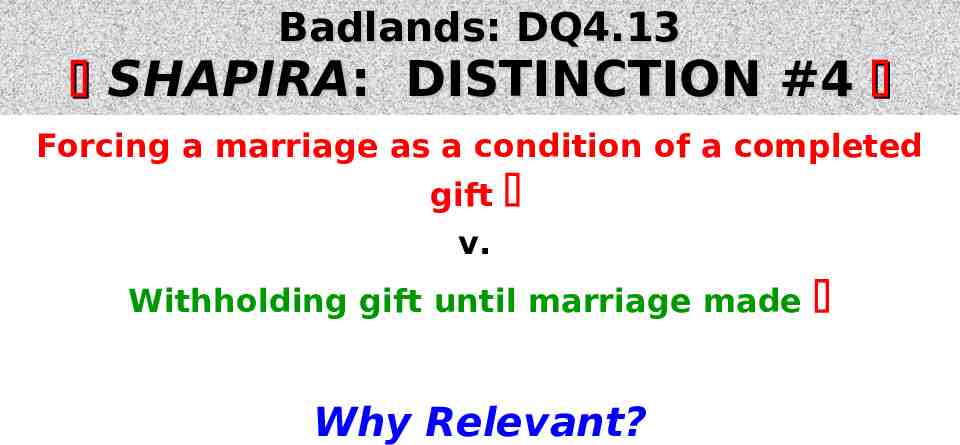
Badlands: DQ4.13 SHAPIRA: DISTINCTION #4 Forcing a marriage as a condition of a completed gift v. Withholding gift until marriage made Why Relevant?
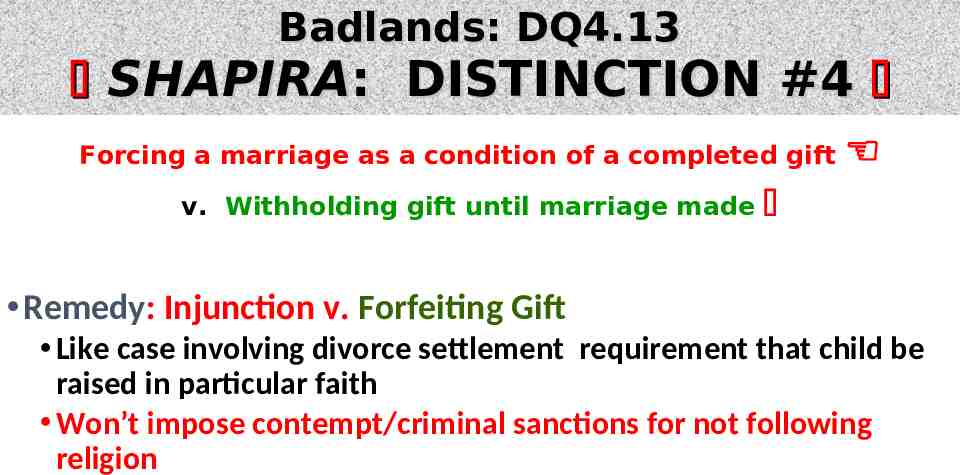
Badlands: DQ4.13 SHAPIRA: DISTINCTION #4 Forcing a marriage as a condition of a completed gift v. Withholding gift until marriage made Remedy: Injunction v. Forfeiting Gift Like case involving divorce settlement requirement that child be raised in particular faith Won’t impose contempt/criminal sanctions for not following religion
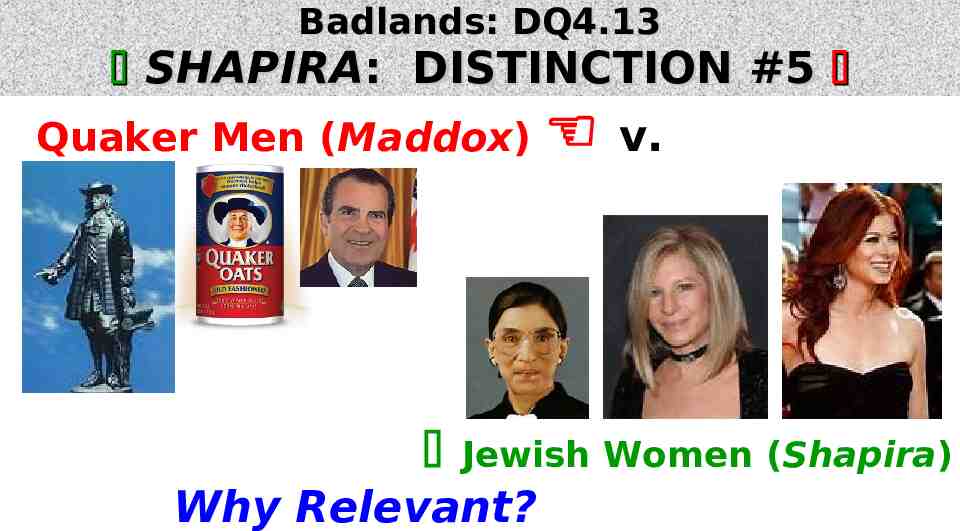
Badlands: DQ4.13 SHAPIRA: DISTINCTION #5 Quaker Men (Maddox) v. Jewish Women (Shapira) Why Relevant?
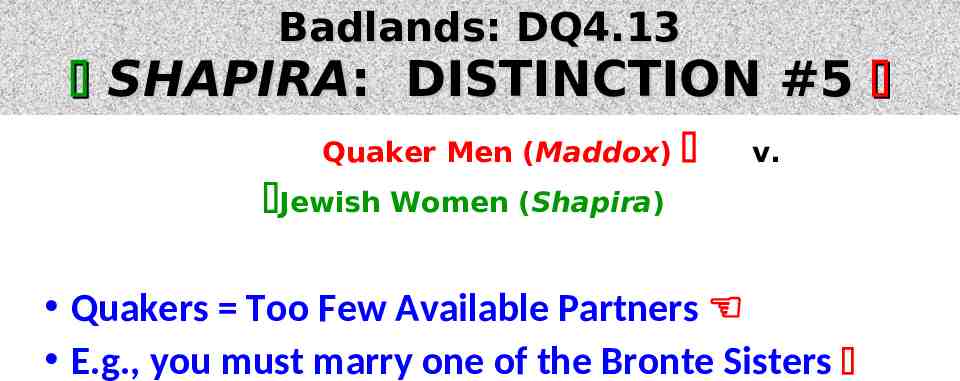
Badlands: DQ4.13 SHAPIRA: DISTINCTION #5 Quaker Men (Maddox) v. Jewish Women (Shapira) Quakers Too Few Available Partners E.g., you must marry one of the Bronte Sisters
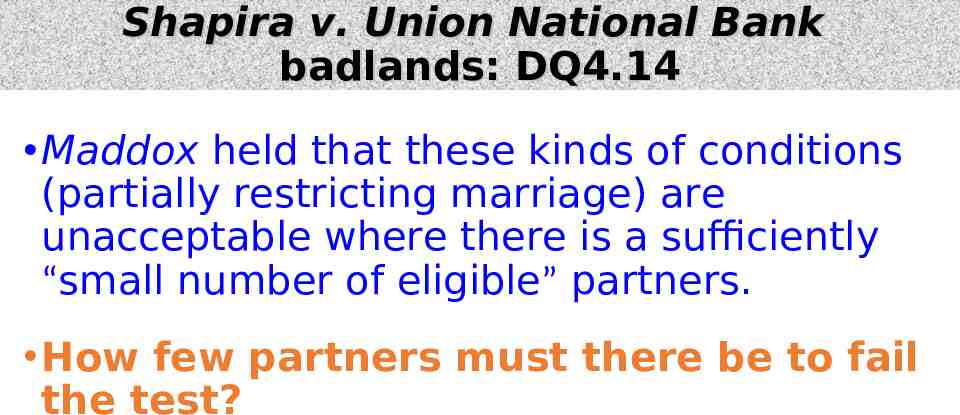
Shapira v. Union National Bank badlands: DQ4.14 Maddox held that these kinds of conditions (partially restricting marriage) are unacceptable where there is a sufficiently “small number of eligible” partners. How few partners must there be to fail the test?
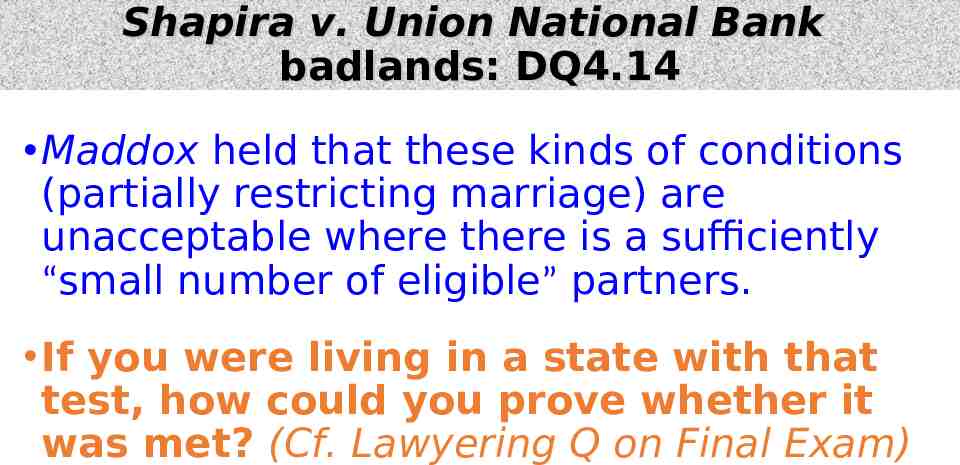
Shapira v. Union National Bank badlands: DQ4.14 Maddox held that these kinds of conditions (partially restricting marriage) are unacceptable where there is a sufficiently “small number of eligible” partners. If you were living in a state with that test, how could you prove whether it was met? (Cf. Lawyering Q on Final Exam)
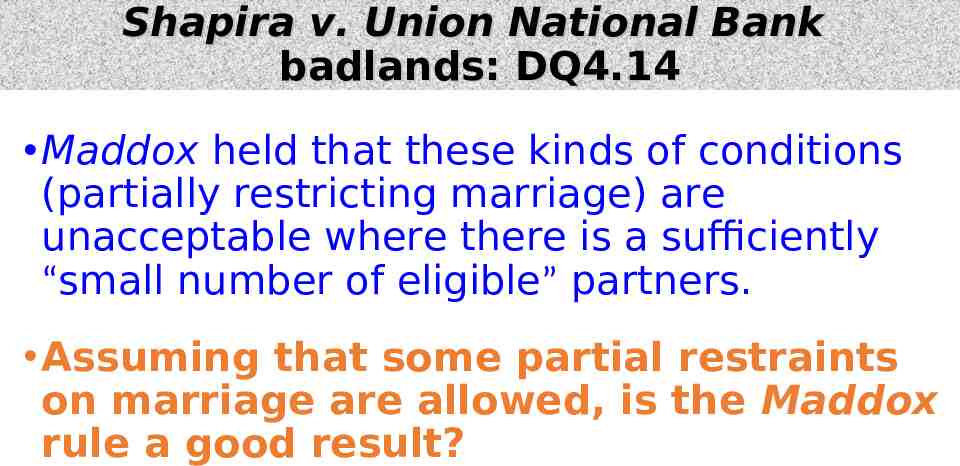
Shapira v. Union National Bank badlands: DQ4.14 Maddox held that these kinds of conditions (partially restricting marriage) are unacceptable where there is a sufficiently “small number of eligible” partners. Assuming that some partial restraints on marriage are allowed, is the Maddox rule a good result?
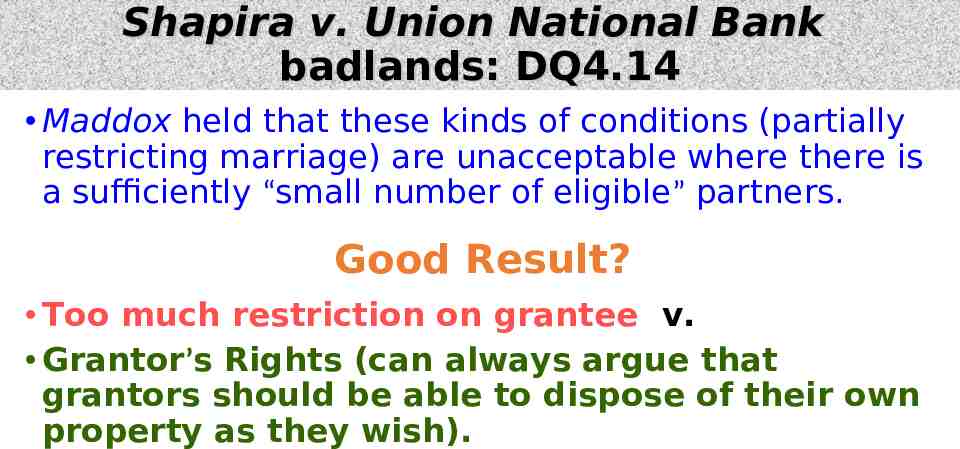
Shapira v. Union National Bank badlands: DQ4.14 Maddox held that these kinds of conditions (partially restricting marriage) are unacceptable where there is a sufficiently “small number of eligible” partners. Good Result? Too much restriction on grantee v. Grantor’s Rights (can always argue that grantors should be able to dispose of their own property as they wish).

Questions on Shapira?





